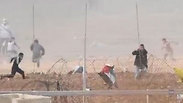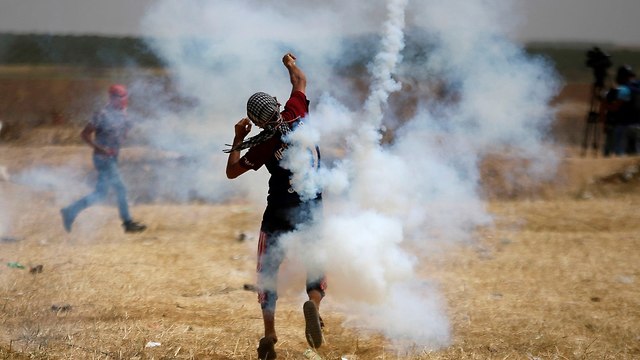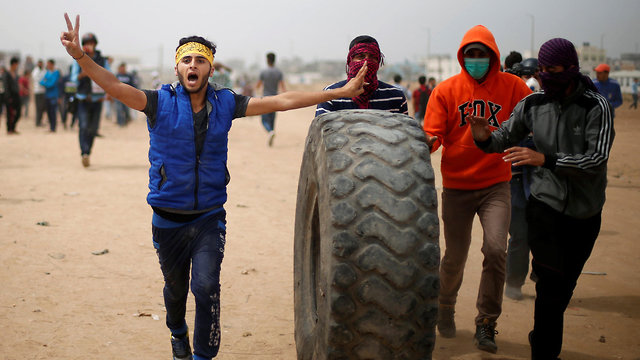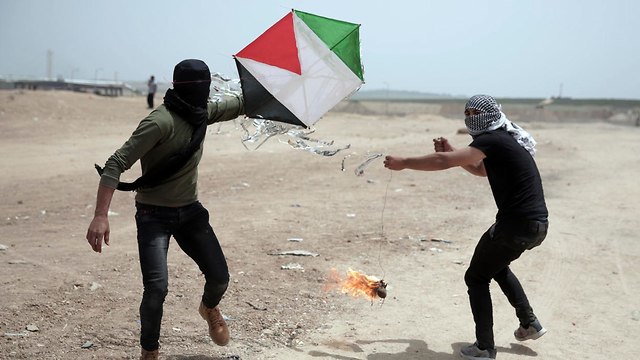

The real story behind Gaza's marches: The Gazans who chose to stay home
Analysis: The ordinary Palestinian is not only politically weary, he is also increasingly alienated from his leadership and political institutions as venues to propel a meaningful change in his life. Under such circumstances, responding to Hamas’ calls to protest and risk one’s lives by marching towards the border makes little sense.
One might expect the representative to put up more of a fight. After all, the marches’ organizers portrayed them as a popular Palestinian response to the ongoing Israeli occupation and as an attempt to redraw the attention of the international community to the plight of the Palestinians.
Surprisingly, however, the Gazan went out of his way to convince the Israeli soldier that the bus company had no intention of neither participating nor driving people to the protest. It was Hamas, the representative said, that intimidated, jailed, and replaced the company’s drivers with other drivers who eventually drove the protesters to the march.

Considering that the march was indeed a popular response of Gaza’s population, the representative’s claims seem odd. But in fact, the relatively low number of participants indicates the general mood in the Gaza Strip. The real story behind the weekly marches near the Israel-Gaza border is not the minority of the strip’s residents who have been protesting there. The story is about over a million Gazans who preferred to stay home.
The ordinary Palestinian is not only politically weary, he is also increasingly alienated from his leadership and political institutions as venues to propel a meaningful change in his life. Under such circumstances, responding to Hamas’ calls to protest and risk one’s lives by marching towards the border makes little sense. Palestinians might now search for other ways to change the current situation.
Hamas is well aware of this trend. To compensate for the relatively low turnouts, Hamas not only used intimidation, but also mobilized its own men to the protests. For example, of the 19 Palestinian casualties counted after the first march on March 30, 15 were active in one of the militant factions operating in the Gaza Strip, Hamas included. A former senior Israeli official with close contacts in Gaza has confirmed to me this information. Indeed, the difficulty of the Palestinian leadership in the Gaza Strip to mobilize the local population depicts a reality of an even deeper Palestinian political crisis than one might have thought.
This crisis is not limited to Hamas and the Gaza Strip. In east Jerusalem, some Arab residents are now ending 50 years of boycotting the municipal elections and are planned to form a list which is expected to run for seats in the October 2018 elections.
In the West Bank, too, the popularity of President Mahmoud Abbas and the PLO institutions has been waning for years. That absence of popular protests in the West Bank does not mean that West Bankers are satisfied with their condition. Quite on the contrary. Public opinion polls show growing distrust of Fatah’s leadership and President Abbas.

Accordingly, low levels of popular protest can be explained as a function of two main factors. First, in adhering to his policy of “order above all,” President Abbas has tightened the grip of the Palestinian security forces over the population. Second, President Abbas’ concerns that West Bankers will actually not respond to his calls for nonviolent protests. This will be an unequivocal testimony to the President’s lack of popular legitimacy. If this intra-Palestinian political crisis intensifies, it might have widespread adverse implications for both Israel and the Palestinians.
In both the first and the second intifadas, Palestinians—especially the younger generation—played a critical role in mobilizing protest and violence. In both events, young Palestinians worked, to varying degrees, through the institutions for the Palestinian national movement. Whether as members of the PLO during the first intifada or members of Hamas in the second, Palestinians worked in the framework of these organizations in order to change the political landscape. Today, the trend is strikingly different as Palestinians no longer believe in these institutions as agents of change.
As alienation from their political leaders grew and frustration intensified, young Palestinians acted alone, outside of any clear command structure and without material assistance from any group. The “lone-wolf” attacks against Israelis during 2015 and 2016 were a series of spontaneous attacks by individuals; mostly youngsters. But as these attacks proved ineffective to neither change the reality nor spark a third intifada, their frequency and popularity decreased.
As violence proved ineffective and the leadership untrustworthy, what options are left for ordinary Palestinians? Judging from Palestinian demography, young Palestinians are the ones to look at. It is what they will decide to do or not to do that will determine the dynamics of the Israeli-Palestinian conflict in the years to come.

Today, Palestinians are among the world’s youngest people. The age of nearly 75 percent of Palestinians is between 0-29. The majority of them were born around the collapse of the peace talks in 2000. Most of these youngsters have never left the Gaza Strip or the West Bank. The lasting disconnection between Gazans and West Bankers has been gradually shattering the sense of mutual Palestinian destiny. Consequently, their identity has turned increasingly localized. It is mostly associated with Gaza, Ramallah or Bethlehem, less with other Palestinian lands that they have never visited.
The only Israelis they have met, if any at all, wear uniforms and carry arms, making dehumanization of the enemy easier. Like young people elsewhere, young Palestinians are increasingly globalized, interconnected, adventurous, and individualistic. High levels of unemployment, especially among the educated, means that their prospects for a better future do not look promising. Paradoxically, for many young Palestinians the generations that preceded them had a better life.
The Palestinian organizations’ failure to provide the population with the goods and opportunities they yearn for might push young Palestinians to relinquish the idea of an independent Palestine altogether. Instead, the Palestinian millennials might accept, even demand, full Israeli sovereignty over the entire Palestinian territories. In exchange, they will ask one thing: An Israeli citizenship which will grant them full freedom of movement and new opportunities. Absorbing millions of Palestinians into Israel’s territory will amount to an unprecedented demographic shock that will terminate Israel’s Jewish and democratic character.
Neither Israel nor the incumbent Palestinian leadership will be able to quell such a demand through the use of arms or detention. Whatever the young Palestinian generation will demand will constitute the genuine popular desire of the majority of Palestinians in the years to come. It is the younger generation we need to think of, especially because they do not hold the guns.
Moran Stern is a PhD candidate in Government and Politics at the University of Maryland and a graduate fellow in Advanced Israel Studies.















